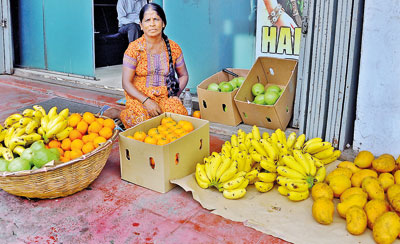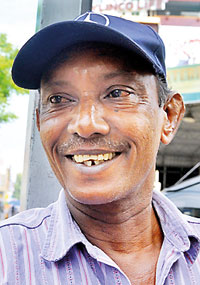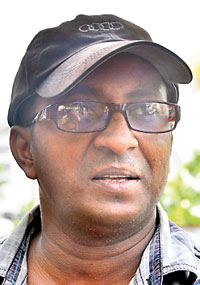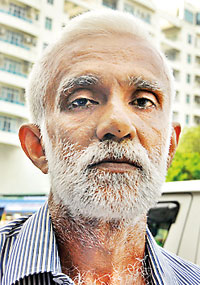News
Monthly fuel price formula ignites prices of food and COL
Monthly fuel price increases according to a much-derided ‘“formula’’ continue to ignite the prices of food and living costs.
On Monday, in keeping with its fuel price formula, the government increased the price of octane 92 petrol by Rs. 6, octane 95 petrol by Rs. 5 , diesel by Rs 4 and super diesel by Rs 8.

Fruit sellers are unable to raise their prices too much. Pix by Priyantha Wickramaarachchi
At Ceypetco fuel stations, a litre of octane 92 petrol is now Rs. 129, octane 95 is Rs 152, diesel costs Rs 103 and super diesel is Rs. 126.
On Tuesday, the Lanka Indian Oil Company also revised prices.
On December 21, the government reduced fuel prices after the 52-day political crisis ended. Petrol was cut by Rs. 10 and diesel prices by between Rs. 5 and Rs 10, depending on the grade.
This week’s fuel price increase once again set off another round of price rises.
A Colombo resident told the Sunday Times that the government had dealt people a blow ahead of the budget, instead of providing relief.
Chamari Samaraweera who has a kiosk near Royal College in Colombo, selling food items and lunch packets to schoolchildren and university students complained of rising costs. But she is unable to raise prices.
“I can’t lose my customers and put the burden on them. I sell a breakfast packet of string-hoppers, or noodles for Rs 80 and lunch for Rs 130,” she said.
She now buys less expensive vegetables to keep her costs under control.

Samantha Jayawardane
“In a packet of rice, I usually serve five varieties — dhal, carrot, beans, pumpkin, and potatoes in addition to fish or egg. Prices of vegetables have gone up. So, I choose less expensive ones,” she said.
Street-side lunch packet seller Chamila Dushmanthi, said she can barely make a profit by selling a packet of rice, vegetables, and fish, or egg for Rs. 100 and a packet of rice with chicken curry for Rs 140.
Her income is spent on her elderly mother and children.
Chamila said most prefer to buy the Rs 100 packet.
“People don’t understand the hardships I go through. Sitting under the umbrella in the hot sun to sell lunch. I used to make lunch packets at home in Horana. But now I buy from a seller and make a few rupees of profit and re-sell them,’’ she said.
Wayside fruit sellers are struggling. They are unable to raise prices too much.
Piyum Nimsara, a fruit seller at Wellawatte, said that he sells rambutan in the off season, taking a risk that there would be demand for the fruit.
“We bring rambutan from Monaragala,’’ he said noting that transport costs are high.
He and his two colleagues sell five rambutan for Rs 100 Rupees.
They earn Rs 4,000 a day but give Rs 2,000 to the employer.
“I try to earn at least Rs 45,000 a month, but family expenses are more than Rs 60,000. I have to pay for water, electricity as well as school fees of my sons,” he said.

Silawathie
On some days, he skips lunch and drinks tea. Food available in the area cost between Rs 750 and Rs 1,000.
A worker at a Wellawatta construction site, Mohomad Idris, 61, said rising living costs compelled him to work at his age.
He is in debt having borrowed Rs 30,000 for expenses. He added that the daily wage of Rs 1,300 is not enough to feed his family and pay bills.
“Food is costly in Colombo. I have to spend at leat Rs 500 for lunch and to return home. I have only Rs 8,000 left for family expenses. I have to educate my daughters and 18-year-old son and look after my wife,” he said.
He said that during the 52 days of the political crisis, the fuel pricing formula was cancelled, but there was no positive impact on the rising costs of living.
“At least the bus fare was reduced by a few rupees and some three-wheeler drivers reduced fares by Rs 10 last year, but as the UNP again formed the government, the cost of living went up,” he said.
Mr Idris said that a quarter loaf of roast bread priced at Rs 22 now costs Rs 28. He said the bakers have increased bread prices.
Ms R. Silawathie, 61, a resident of Piscal Road, Wellawatte, said that the price of rice has increased to Rs 100 while a coconut costs Rs 75.
“Most food is expensive. Vendors say that transport costs are high. My husband only receives a Rs 20,000 pension, he is unwell and I am also a diabetic. We have to eat, buy medicines and pay bills,’’ she complained.

Piyum Nimsara

Mohomad Idris
Meanwhile, a three-wheeler driver at Wellawatta, Samantha Jayawardena, said fuel prices continue to increase and government pleas to reduce fares are useless as a result.
“This formula is a curse. After the 10th of every month, prices increase, and before that, there are long lines at filling stations.’’
The president of the All Island Three-wheel Drivers Association, Lalith Dharamasekara, said there is no need to adjust fares as the increase in petrol price was only Rs 6.
“The government’s fuel formula is impractical and unstable, we can’t increase or reduce fares according to their announcement. Every month we have to keep revising fares,’’ he said.
The president of the All Island Bakers Association, N.K Jayawardena, said a decision has not been taken on price increases.
But some mobile bakery product sellers (choon paan sellers) and some bakers have raised prices, citing higher transport costs.

